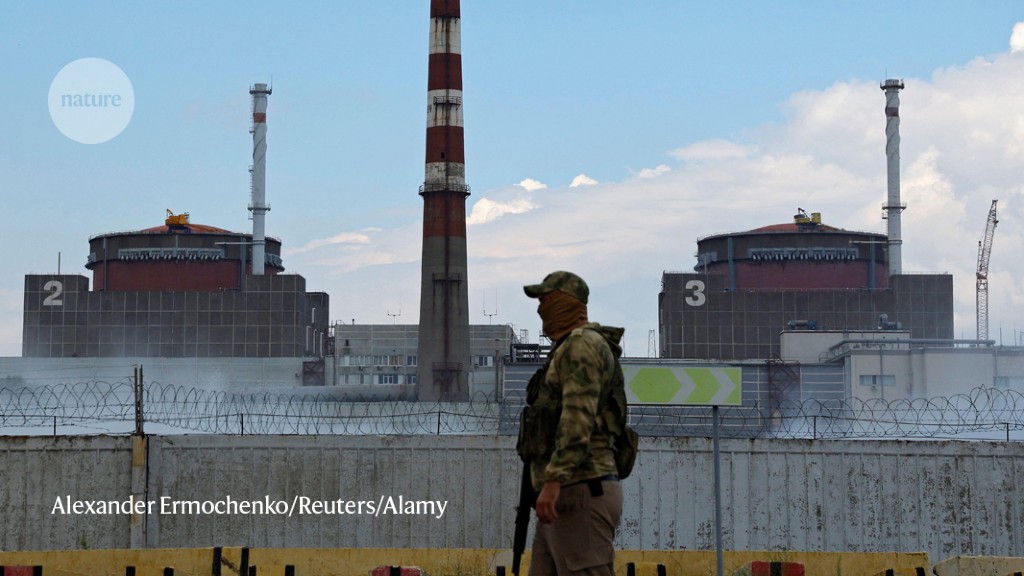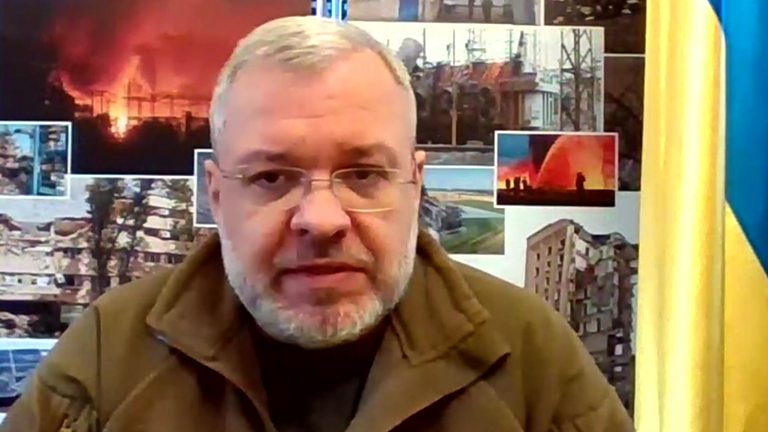
‘One-in-Five Risk of a Meltdown’ at Ukraine Reactor
Where Janitors and Cleaners Sit In for Engineers
Jack Clover and Viktoria Sybir / The Weekend Australian
(September 17, 223) — The chance of a serious disaster at the Ukrainian nuclear power plant occupied by Russia has risen to one in five, a leading engineer at the Soviet-era facility has warned.
An exodus of top staff and the power station’s use as a military base by Chechen troops are among the reasons why a “Fukushima scenario” could happen at any time, according to one of the ten most senior engineers at the plant near Zaporizhzhia, which had a pre-war workforce of 11,000.
The shortage of expertise is so acute that janitors, secretaries and “blue-collar” workers are posing as engineers in lab coats to dupe international observers into believing that the Russians have the necessary staff to avert disaster, according to sources with knowledge of conditions inside the facility.
The Zaporizhzhia plant is the largest in Europe. Before Russian soldiers arrived last year, only 160 senior staff members were licensed to supervise its six reactors. Of these, about 30 agreed to collaborate with the Russians, while the remaining 80 per cent stayed in the adjoining occupied town of Enerhodar, ready to work in an emergency. But a brutal crackdown over the summer against residents yet to obtain Russian passports drove 100 of those engineers to take the perilous journey to escape.
Ivan and his wife, Natalia, whose names have been changed to protect the identity of family members still living in occupied territory, were among those who left. “For an operating reactor, a serious emergency should only happen once in 10,000 years, and now we measure it in terms of will it happen or not,” said Ivan.
“I personally consider it a 10-20 percent likelihood of a serious emergency, and a 50-60 percent chance that they will damage everything when they leave,” he added.

Ivan considers a serious emergency a meltdown in one or more of its six reactors, with similar causes but worse consequences to those in the 2011 Fukushima nuclear disaster in Japan, which displaced 164,000 people from the surrounding contaminated areas.
The net capacity of the Zaporizhzhia plant is a third larger than Fukushima. “Let’s say this, in the worst scenario. All six [reactors] blow. The whole Black Sea basin and all of Eastern Europe will be affected,” Ivan said.
The Fukushima disaster happened when a tsunami caused all electricity inputs to fail and back-up generators to be damaged. Ivan fears the same at Zaporizhzhia, especially with the onset of winter and another expected assault on Ukraine’s energy infrastructure.
“The biggest risk is a full power outage,” he said from his new home in Kyiv. “It’s already happened [several] times, and before that for 40 years it didn’t happen once.”
Before Russia seized the area in March last year, there were seven to eight electricity inputs to the plant. Now only one cable is fully operational and one reserve cable is partially working. In the event of a power cut, there is a race against time to stabilise the reactors. Five reactors are being kept “cold” and one is in a “hot” standby mode. Without power, the hot reactor could fail in six to seven hours, while cold reactors would take one to two days.
The 20 backup diesel generators have not been maintained since the start of the invasion, and with each blackout the equipment is further damaged.
Observers from the International Atomic Energy Agency (IAEA) arrived in August last year to monitor the plant, but Ivan says their work has been ineffective.
“The IAEA observers work like extras in a movie. They just walk up to the reactor control panel and they know that there should be five people sitting there.
“We [engineers] have quite a specific uniform, it’s a different colour. So they just arrive and count that there are five people and that’s that. Then later it turns out that of those five, three are clowns, and two are from the actual shift. These clowns just sit there for 20 minutes, the IAEA leave, and they’re off.
“People who spent all their life as janitors, there are cases that I have heard of, that they became heads of department, because all the decent people have left.”
The observers are also under the constant escort of the Russian secret police, the FSB: “They go everywhere escorted by the FSB. What the FSB don’t want them to see or hear, they don’t see or hear.”
In early July, after Ukrainian reports that Russian troops had planted explosives on reactor roofs, the IAEA inspected the site and claimed they were unable to find evidence of this. But as of September 8 they had not been granted access to four of the six reactor roofs.
The IAEA stressed the importance of its presence, without addressing concerns about access and staffing. It said: “Without the presence of the IAEA, the world would have no independent source of information about Europe’s largest nuclear power plant, which is on the front line of the war in Ukraine.”

Ukrainian Minister of Energy German Galushchenko.
German Galushchenko, Ukraine’s minister of energy, said: “The issue of the IAEA is still active. Unfortunately, they don’t have the freedom to move around the plant that would be key for any kind of inspection.”
He echoed Ivan’s warning of a power cut leading to nuclear disaster, especially as Russia is expected to renew its assault on Ukraine’s energy infrastructure as autumn progresses.
“Seven times, all power lines that guarantee the safety system at the station have been cut off due to [missile] strikes. It’s a great risk. A station that is already backing up its electricity with diesel generators is already a risk — it’s one step before a Fukushima scenario.
“Any rocket or drone even accidentally falling on a working diesel generator and we have a nuclear emergency. The process will start and no one can stop it. No one.”
Read More
- Ukraine’s counteroffensive ‘begins in Zaporizhzhia’
- Russian shelling cuts Zaporizhzhia plant power
- Russia warns of nuclear catastrophe at Zaporizhzhia
Posted in accordance with Title 17, Section 107, US Code, for noncommercial, educational purposes.